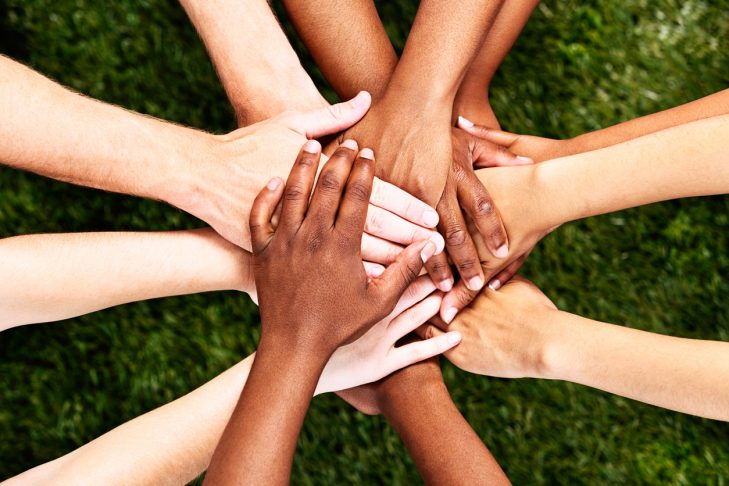Just a few weeks old, the Boston Chain of Peace is an initiative of novelists Rachel Kadish and Michael Lowenthal, and Rabbi Susan Fendrick. The three Boston-area residents are Jewish descendants of Holocaust refugees and survivors who have organized a gathering to show support for the Muslim community. On Friday, Feb. 10, people of “all faiths and no faiths” will stand at the entrance of the Islamic Society of Boston Cultural Center (ISBCC) in solidarity with worshippers attending the Jumu’ah service, the noon prayer said only on Fridays.
“We chose that time,” Kadish told JewishBoston, “because it is the biggest service of the week at the mosque; over 1,000 people attend. The idea is that we are going to make a human chain to line the entranceway of the mosque. We want to be very quiet and respectful, so we’re encouraging people to come without signs. ”
Kadish’s maternal grandparents were originally from Poland and among the several thousand Jewish refugees issued transit visas by Japanese diplomat Chiune Sugihara. Kadish’s family eventually ended up in Mexico after their boat was turned away in San Francisco. “The image of refugees hits very personally,” said Kadish, whose mother was born in Mexico. “When you grow up around refugees, you know your world and others’ can be upended very quickly.”
Refugees from Hitler’s Germany, Lowenthal’s paternal grandparents arrived in America just after Kristallnacht in 1939. “They lost their families, their possessions and their homes,” he said. “I was raised to know the importance of ‘welcoming the stranger.’”
Fendrick’s mother and grandparents survived the Holocaust in hiding. Fendrick noted: “[When] I say ‘Never Again,’ it’s not an abstract idea about the need to remember history or be condemned to repeat it. But it is the very concrete reality that when xenophobia and violence go unchecked, the consequences can be horrific.”
Plans for the Boston Chain of Peace quickly fell into place after Kadish heard about the murders of six worshippers in a Quebec City mosque last month. Inspired by the “Ring of Peace” young Muslims organized last year in the wake of the murders at a kosher grocery store in Paris, the Charlie Hebdo shootings and an attack at a Copenhagen synagogue, she texted a few friends about creating Boston’s version of the ring. She heard from Lowenthal and Fendrick immediately.
“After I got their responses, I realized we are also children and grandchildren of Holocaust survivors and refugees,” she said. “It contributed to the feeling that we had to act, we had to do something.”
Kadish intends the Boston Chain of Peace to be a shield, as well as an honor guard, while people congregate for prayers in the mosque. “We want to be there to say, ‘We stand with you with our presence and our bodies,’ she said. “It’s a very simple gesture, but one that is important to make.”
Lowenthal and Fendrick echo Kadish’s determination to be visibly present. “I feel that when we are in a position of relative safety and privilege, we should lend our bodies and voices in support of a community that is in a more precarious situation,” Lowenthal said. “What I want to show with our bodies is that our safety is directly linked to their safety, and vice versa.”
Fendrick added that founding the Chain of Peace enables her “to find a way to do something and to say something—to speak with our presence and our bodies, to give the message, ‘We will not let you be victimized.’”
Ayesha Kazmi, a community organizer and executive assistant to ISBCC’s executive director, said, “When I found out the Boston Chain of Peace was being organized by the descendants of Holocaust survivors, I thought, ‘Who would know better than the descendants of the victims of the Holocaust about [threats] to our values as Americans?’” Kazmi also asserted that alliances between various Jewish and Muslim communities, as exemplified by the Boston Chain of Peace, “have been a very big source of comfort to us.”
The Boston Chain of Peace founders noted the camaraderie between ISBCC and their organization has roots in the history lessons of the Holocaust. “For every person who survived Hitler’s Europe in 1939, not one but many people reached out and helped,” observed Kadish. Those people included Chiune Sugihara and the Christian Polish family who hid Fendrick’s family.
“When you know you are alive because someone did the right thing, there’s a debt you owe,” Kadish said. “We need to do the right thing for each other. It might not be our turn this time, but we have to be on the lookout and recognize when bad things are happening.”



